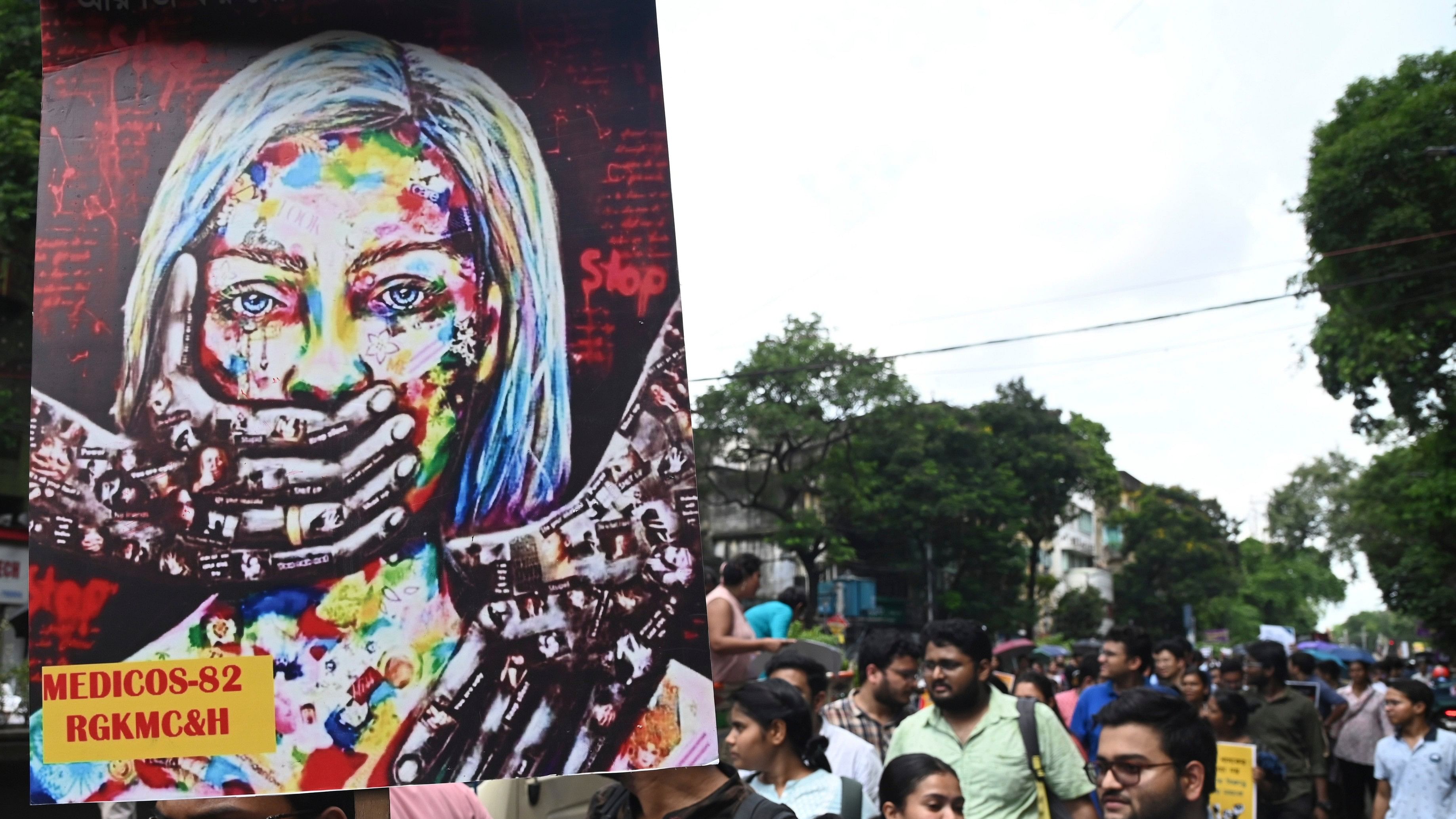
Junior doctors take part in a protest rally against the alleged sexual assault and murder of a postgraduate trainee doctor at R G Kar Medical College and Hospital, in Kolkata.
Credit: PTI Photo
Massive protests have erupted following the gruesome crime against a young woman doctor at the RG Kar Hospital in Kolkata. Citizens rallied for the ‘Reclaim the Night’ march, opposition parties in West Bengal have voiced their concerns, and even the West Bengal chief minister led a protest march. Social media is aflame, and the Calcutta High Court has passed appropriate orders and strictures. The Kolkata police and the ruling Trinamool Congress have come under unprecedented fire, and now the Central Bureau of Investigation has taken over the investigation. The Supreme Court of India has also taken suo motu cognisance of the case.
Hopefully, all this will ensure that justice is served. But what next? What happens when the protests die down and everyone moves on? Will it lead to any significant changes in policing in India? According to National Crime Records Bureau (NCRB) figures from 2022, approximately 31,000 rapes occur in India every year, along with about 500 cases of murder with rape or gangrape.
Which state in India hasn’t witnessed such terrible crimes repeatedly? Here is a short, random list:
West Bengal: the rape and murder of a woman doctor at the RG Kar Hospital
Maharashtra: the sickening sexual violation of kindergarten girls at a school in Badlapur
Karnataka: the horrifying sexual exploitation of nearly 3,000 women by a sitting Member of Parliament, exposed just this April/May.
Manipur: the gang rapes and killings of 2023
Uttarakhand: the rape and murder of a young hotel receptionist by an influential local leader’s son in 2022.
Uttar Pradesh: the horrifying Hathras gang-rape and murder of a Dalit woman in 2020
Telangana: the gory gang rape of a young veterinarian in 2019, following which the suspects were shot in an encounter
Bihar: the Muzaffarnagar Shelter rape case 2018
Jammu & Kashmir: the infamous Kathua rape and murder case of a young girl, 2018
We can go all the way back to the Nirbhaya rape and murder case of 2012, spanning different states and various political parties in power at different points in time. Outrage typically stems from the suspicion that someone in the government, police, or administration is attempting to shield the rapists or trying to destroy evidence. And these are just the cases that have blown up in the media.
Amidst all this blame game, what is often lost sight of is that at the root of this problem is the total and utter politicisation of the police force. Who trusts the police today? Do citizens trust the police to act against wrongdoers, against even the smallest of crimes/criminals that have some kind of political backing? Do the police enforce the law? Look around your own neighbourhood. Try lodging a complaint in the nearest police station against anything that comes to your notice as unlawful. The chances are the first thing you encounter is the reluctance to accept a complaint. Next, just listen to what the police tell you. Often, they try to explain why their hands are tied or why they cannot do anything, practically speaking, for petty illegalities.
Assuming you wish to complain about a criminal offence—something the police must take cognisance of their first attempt is to stall. The family of the Badlapur victims, for instance, had to wait for 12 hours just to get their complaint registered. Next, the police try to ‘resolve the matter’ between the parties, which immediately brings the wrongdoer and the complainant on an equal footing. This, in itself, undermines the seriousness of the complaint and the offence because of the concept of ‘amicable resolution’, which encourages the person against whom the complaint is sought to be lodged, bellicose. If finally one still insists on a formal complaint, there is the possibility of a counter-complaint being lodged by the other party. And this is just the beginning, because often the person with more influence or ability to grease palms will eventually prevail.
Now, coming to serious crimes, the police do indeed manage to act professionally and impartially, in many cases, but the moment power, political influence, or money comes into play, they simply decide to bow down to the inevitable. This is because long experience has taught them that it is better to do as the powers that be and senior officers tell them to do, because one upright person can rarely do much if the overall consensus is to not cross swords with those above you.
So, unless we push the states and central governments to implement police reforms, where the police are serving us, ordinary citizens, rather than parties and their entire network of supporters, these protests triggered by gory crimes will rarely change anything, except perhaps justice in the specific case, which too will be short-lived.
Also, it is difficult to understand how new laws for protection of doctors or women in the workplace alone will help. What about the rest of the population? Are people in other professions less susceptible to violence?
Our outrage will count for little unless we demand a fundamental change in the basic equation between the police and citizens and reforms that loosen political hold over day-to-day policing. Nothing is likely to change unless policing itself is improved and made people-friendly!
(The writer is an author, specialising in crime novels)